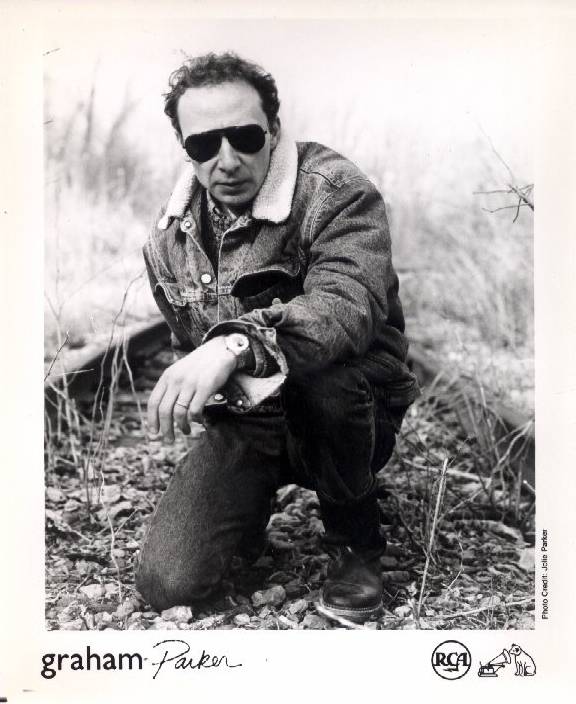

Graham and the Rumour follow up with
two more releases that the press does not embrace, STICK TO ME
and THE PARKERILLA, though interest and confidence in the artist
and the band remain. In 1979, undaunted and alive with renewed
creativity, Parker and the Rumour release SQUEEZING OUT SPARKS
and earlier press projections are confirmed: the band can still
deliver what was promised in 1976, and more. It becomes the band's
first commercial breakthrough, spawning "Local Girls,"
"Discovering Japan," and "Passion Is No Ordinary
Word." (Nine years later, it, along with HOWLIN' WIND, will
make the Top 55 of Rolling Stone's list of the best rock
and roll releases over the past 20 years, claiming SPARKS to be
"... as exhilarating, driving and downright fearsome as anything
to come out of the late Seventies.")
1988: Graham's secret then, and now,
as to why SQUEEZING OUT SPARKS was such an artistic success, is
control, something he's brought back with THE MONA LISA'S SISTER,
his new LP on RCA Records. But that isn't to say there aren't
differences between the albums. After time, the break-up between
him and the members of the Rumour in 1980, and five more LPs,
comparing and contrasting the two is easy. For instance, on his
new LP (and his tenth to date), Graham has directed his own music
and his own ideas, much in the style of SPARKS. "I didn't
let the music run away from me," he says.
Graham worked from his "very
simple demos" with collaborator and LP co-producer Brinsley
Schwarz, also once the guitar lead behind Graham's Rumour. As
co-producers, Parker and Schwarz work off each other to bring
the crisp, tight line of the LP to it's fullest, most gratifying
sound. "I'm not a producer in the technical sense of the
word," he says. "Brinsley picks up my concepts and
my ideas and rolls with them."
But Graham knows what he wants, and
more importantly, he knows what he doesn't want. "My music
isn't as frantic as it once was," he says. "I was working
with the Rumour, and they were a frantic band."
THE MONA LISA'S SISTER
is a much more balanced LP, though equally as powerful and compelling
as anything he's ever offered before. He's still a master at
hooking a range of influences into songs that scream of originality,
incorporating rock ("Back In Time"), reggae ("The
Girl Isn't Ready"), rockabilly ("I Don't Know"),
and the blues ("I'm Just Your Man"). And it is all
delightfully true to Graham Parker form.
Lyrically, the album is gratifyingly
defiant. Mixing dark but direct song topics with his clean, progressive
guitar and jagged vocals, Graham channels his passion and anger
through a number of topics, from the state of modern marriages
in "Under The Mask Of Happiness," and greed in "Success"
to depression in "Don't Let It Break You Down." (And
in the latter song, Parker actually addresses his ambivalent relationship
with the press: "Some people are in charge of pens/That shouldn't
be in charge/Of brooms/They have the nerve to/Rip up a man's life/In
a paragraph or two..")
The album also yields two surprises.
The first concerns a painting by Parker's late father-in-law,
Jack Drummond. Graham was initially so inspired by the painting
(which is now the cover of the album jacket), he sat down and
wrote the lyrics to the first single, "Get Started. Start
A Fire," a song about repression and jealousy: "The
Mona Lisa's sister doesn't smile/She tried to pose but only/For
a while/Leonardo sent her home/Since then she has lived alone/With
her few belongings/And a copy/Of a painting of herself unhappy/She
is going to burn it/When she's ready ... "
The second surprise is Graham's cover
of the old Sam Cooke chestnut, "Cupid." Parker says
he just started to play the song one day, intending it to be the
b-side of the single, but liked it so much he just included it
on the LP. (Those wanting to sing along with Graham on "Cupid"
better know how it goes. In place of the lyrics on the inner
sleeve is the phrase, "you already know the words.")
But even with a cover tune included
on THE MONA LISA'S SISTER, the album represents 100 percent
of Graham Parker's ideas. The four LPs that followed SQUEEZING
OUT SPARKS -- THE UP ESCALATOR, ANOTHER GREY AREA, THE REAL MACAW
and STEADY NERVES -- taught the musician a few lessons in creative
control. "In this day and age," he says, major labels
are more involved with the record. They want to involve themselves
in the production and the songs, then talk about how the record
was made. It's not something I'm comfortable with."
While Graham admits that in music,
there's always a compromise ("the minute a song comes out
of your mouth -- it's been compromised"), music should be
natural. "You can't forge a product," he adds.
Nor can he create a quality release
to please anyone but himself first, says Graham in "Success,"
his lambasting song about what happens when anything other than
artistic integrity enters into the making of a record: 'They say
they want you/For your colourful evocation/The way you turn a
cliche/Into a sensation/But all they ever wanted/Was that same
vibration/The one that shimmers/Around success."
RCA clearly knows that this is how
Parker feels, thus giving him the space to steer the course of
his own music, and recognizing that Graham Parker's musical triumphs
are the result of a talent left to his own (brilliant) devices.
|
RCA RECORDS LABEL PUBLICITY DEPARTMENT
1133 AVENUE OF THE AMERICAS NEW YORK, NY 10036 (212) 930-4340
RCA RECORDS LABEL PUBLICITY DEPARTMENT 6363 SUNSET BOULEVARD LOS ANGELES, CA 90028 (213) 468-4123 |
Back to GP album discography | GP promos and more